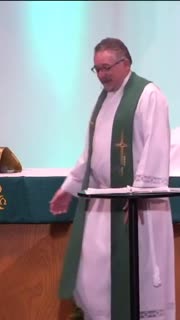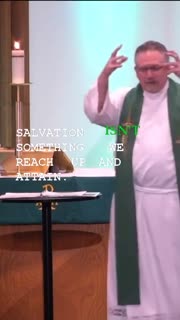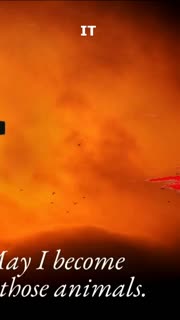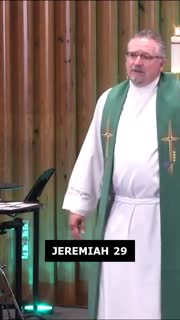Judgment and Hope: God's Covenant Promise in Christ
Devotional
Sermon Summary
Bible Study Guide
Sermon Clips
1. "Jeremiah says, People of God, you entered into covenant with the Almighty, and you broke covenant. You were unfaithful to your promises. You ran away from the God of promise. You persisted in your sin and unbelief, and even when the northern kingdom was taken into exile, you still wouldn't repent. So you're going to become like those animals. Terrible words. Terrible words of judgment in Isaiah." [04:31] (26 seconds)
2. "When we take that promise, that strong promise from God, and kind of domesticate it, and give it a snack, and pat it on its head, and put it on a leash, when we take that promise and we put it in a box, we end up misreading that promise. It's the kind of thing that you would cross-stitch and put on needlepoint, put it on your wall, right? And it belongs there as a reminder of a strong promise, and yet, taken out of context, it can become, almost a talisman, almost a good luck charm." [05:42] (31 seconds)
3. "In our culture, we have a fundamental way of thinking and living that says good is up and down is bad. It's like we've got a ladder in our own experience. In the experience of our own bodies and the way we talk in our culture, I mean, you can be, things can be looking up for you, or business can be on the rise, or your spirits can rise, or you can even jump for joy. And everything that's good is up." [08:12] (26 seconds)
4. "My friend said, when you're at the bottom of the ladder, you cannot relate to the God that's at the very top of the ladder. He's so far away. And it feels like he's mad at you. We experience in our bodies, we talk about this way in the English language. We live like this in our culture. Good is up and therefore bad is down. And when bad things happen, it feels like you're far away from the God who must be up there at the top of the ladder, up in heaven somewhere, where all the good things are." [12:37] (31 seconds)
5. "But I have to tell you, the biblical witness is not that good is up and bad is down. For the Bible, salvation is fundamentally down. God comes down to rescue the people of Israel from Egypt in Exodus chapter 3. God comes down to cut covenant. With those chosen, redeemed people on Mount Sinai in Exodus 19. Isaiah, the prophet's plea for salvation is that Yahweh would rend the heavens and come down. That's the goal, the promise, the hope that God would come down." [13:29] (32 seconds)
6. "Salvation isn't something we reach up and attain. Salvation is something that comes down from God. As finite, fallen human beings, we can't even get all the way up the ladder to God. They tried. Remember the Tower of Babel? Back in Genesis chapter... In the Tower of Babel, they built intentionally to go all the way up to the heavens. And ironically, Genesis 11 tells us, God said in heaven, what are they doing down there? Let's go down and find... He can't even tell what they're doing from way up here. He's got to go all the way down to find out what they're doing with that tower." [14:25] (32 seconds)
7. "Jesus in the garden of Gethsemane is God come all the way down the ladder to meet us at the very bottom. My friend said he could hardly pray, but with faltering lips he could also say, but thy will be done. Just as Jesus in the garden prayed, not my will, but thy will be done. Jesus prays in the garden, your will be done, Father. And you see God's will be done, but it's not the kind of prosperity that you expect. Isaiah gives us a picture of what's going on in Gethsemane at the cross. He says, it was the will of the Lord to crush him." [16:50] (43 seconds)
8. "Jesus prays, let this cup pass from me. And yet this cup of judgment that we read about in the book of Jeremiah, this cup of judgment, Jesus will drink to the dregs so that he can offer you and me a different kind of cup. Did you hear it in Matthew chapter 26? Jesus gives, gives you a different cup. As they're eating, Jesus took bread and broke it and said, take and eat, this is my body. And then he took a cup. And when he had given thanks, Jesus gave it to them saying, drink of it, all of you, for this cup is what? My blood of the covenant." [18:16] (32 seconds)
9. "So when it feels like you've been knocked off the ladder and it somehow must be your fault, you run to the blood of the covenant. Paul, in Romans chapter 8, says, there is now no condemnation for those who are in Christ Jesus. There's no condemnation left. Jesus drank the cup to its drain. Jesus took the punishment for the covenant on himself and his bloody body on the cross. There's no condemnation left for those who are in Christ Jesus." [20:47] (27 seconds)
10. "Jeremiah 29 is an invitation to cling to Jesus. When you see that promise in light of Jesus, in light of the cross and the blood of the new covenant, when you hold on to that promise, as you hold on to the cross of Jesus, then you know the plans I have for you, declares the Lord, plans to prosper you in Jesus and not to harm you, plans to give you hope in Jesus and a future in Jesus. And then that strong promise becomes, well, not a good luck charm, but something you can hold on to no matter what." [22:15] (40 seconds)
Ask a question about this sermon
2. "When we take that promise, that strong promise from God, and kind of domesticate it, and give it a snack, and pat it on its head, and put it on a leash, when we take that promise and we put it in a box, we end up misreading that promise. It's the kind of thing that you would cross-stitch and put on needlepoint, put it on your wall, right? And it belongs there as a reminder of a strong promise, and yet, taken out of context, it can become, almost a talisman, almost a good luck charm." [05:42] (31 seconds)
3. "In our culture, we have a fundamental way of thinking and living that says good is up and down is bad. It's like we've got a ladder in our own experience. In the experience of our own bodies and the way we talk in our culture, I mean, you can be, things can be looking up for you, or business can be on the rise, or your spirits can rise, or you can even jump for joy. And everything that's good is up." [08:12] (26 seconds)
4. "My friend said, when you're at the bottom of the ladder, you cannot relate to the God that's at the very top of the ladder. He's so far away. And it feels like he's mad at you. We experience in our bodies, we talk about this way in the English language. We live like this in our culture. Good is up and therefore bad is down. And when bad things happen, it feels like you're far away from the God who must be up there at the top of the ladder, up in heaven somewhere, where all the good things are." [12:37] (31 seconds)
5. "But I have to tell you, the biblical witness is not that good is up and bad is down. For the Bible, salvation is fundamentally down. God comes down to rescue the people of Israel from Egypt in Exodus chapter 3. God comes down to cut covenant. With those chosen, redeemed people on Mount Sinai in Exodus 19. Isaiah, the prophet's plea for salvation is that Yahweh would rend the heavens and come down. That's the goal, the promise, the hope that God would come down." [13:29] (32 seconds)
6. "Salvation isn't something we reach up and attain. Salvation is something that comes down from God. As finite, fallen human beings, we can't even get all the way up the ladder to God. They tried. Remember the Tower of Babel? Back in Genesis chapter... In the Tower of Babel, they built intentionally to go all the way up to the heavens. And ironically, Genesis 11 tells us, God said in heaven, what are they doing down there? Let's go down and find... He can't even tell what they're doing from way up here. He's got to go all the way down to find out what they're doing with that tower." [14:25] (32 seconds)
7. "Jesus in the garden of Gethsemane is God come all the way down the ladder to meet us at the very bottom. My friend said he could hardly pray, but with faltering lips he could also say, but thy will be done. Just as Jesus in the garden prayed, not my will, but thy will be done. Jesus prays in the garden, your will be done, Father. And you see God's will be done, but it's not the kind of prosperity that you expect. Isaiah gives us a picture of what's going on in Gethsemane at the cross. He says, it was the will of the Lord to crush him." [16:50] (43 seconds)
8. "Jesus prays, let this cup pass from me. And yet this cup of judgment that we read about in the book of Jeremiah, this cup of judgment, Jesus will drink to the dregs so that he can offer you and me a different kind of cup. Did you hear it in Matthew chapter 26? Jesus gives, gives you a different cup. As they're eating, Jesus took bread and broke it and said, take and eat, this is my body. And then he took a cup. And when he had given thanks, Jesus gave it to them saying, drink of it, all of you, for this cup is what? My blood of the covenant." [18:16] (32 seconds)
9. "So when it feels like you've been knocked off the ladder and it somehow must be your fault, you run to the blood of the covenant. Paul, in Romans chapter 8, says, there is now no condemnation for those who are in Christ Jesus. There's no condemnation left. Jesus drank the cup to its drain. Jesus took the punishment for the covenant on himself and his bloody body on the cross. There's no condemnation left for those who are in Christ Jesus." [20:47] (27 seconds)
10. "Jeremiah 29 is an invitation to cling to Jesus. When you see that promise in light of Jesus, in light of the cross and the blood of the new covenant, when you hold on to that promise, as you hold on to the cross of Jesus, then you know the plans I have for you, declares the Lord, plans to prosper you in Jesus and not to harm you, plans to give you hope in Jesus and a future in Jesus. And then that strong promise becomes, well, not a good luck charm, but something you can hold on to no matter what." [22:15] (40 seconds)










